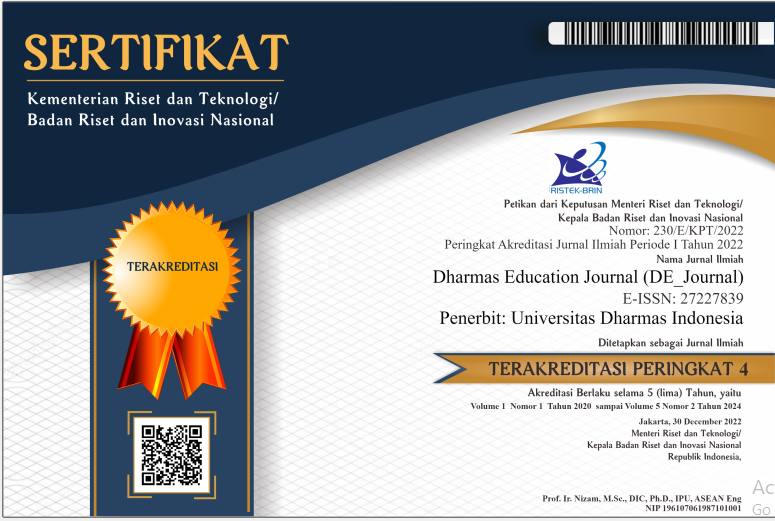PENGEMBANGAN BUKU AJAR BAHASA INGGRIS BERBASIS WAWASAN SOSIO KULTURAL PADA PERGURUAN TINGGI KEAGAMAAN BUDHA (PTKB)
DOI:
https://doi.org/10.56667/dejournal.v4i3.507Kata Kunci:
Buku Ajar, Bahasa Inggris, Sosio-Kultural, Pendidikan TinggiAbstrak
Minimnya buku ajar bahasa Inggris yang berwawasan sosio-kultural pada pendidikan tinggi harus segera diatasi. Salah satu hal yang dapat dilakukan adalah dengan mengembangkan buku ajar yang berwawasan sosio-kultural. Melalui penelitian pengembangan ini dihasilkan buku ajar bahasa Inggris berwawasan sosio-kultural. Sebanyak 74 mahasiswa dilibatkan untuk mengetahui kelayakan buku ajar yang disusun. Selain itu terdapat 3 dosen dan 4 validator untuk memastikan bahwa buku ajar yang dibuat layak untuk digunakan. Angket dan instrumen kelayakan produk dipakai untuk mengetahui kualitas buku ajar yang dibuat. Untuk melengkapi kekurangan yang ada juga dilakukan wawancara kepada para responden. Hasil penelitian menunjukkan buku ajar yang dibuat dinyatakan layak digunakan dengan dibuktikan berdasarkan respon mahasiswa dengan persentase 91,3, kemudian respon dosen sebesar 87,5%, uji coba kelompok kecil dengan nilai kelayakan 92,6%, dan pada uji coba kelompok besar nilai kelayakan sebesar 96,3%.
Unduhan
Referensi
Alsyouf, A., & Al Kayed, M. (2021). Interactive intervention strategy for English as a foreign language classes versus traditional methods to teach speaking. Studies in English Language and Education, 8(2), 479–491. https://doi.org/10.24815/siele.v8i2.18649
Anoegrajekti, N., Sariono, A., Macaryus, S., & Kusumah, M. S. (2018). Banyuwangi Ethno Carnival as visualization of tradition: The policy of culture and tradition revitalization through enhancement of innovation and locality-based creative industry. Cogent Arts & Humanities, 5(1), 1502913. https://doi.org/10.1080/23311983.2018.1502913
Azizah, N., Inderawati, R., & Vianty, M. (2021). Developing descriptive reading materials in EFL classes by utilizing the local culture. Studies in English Language and Education, 8(2), 596–621. https://doi.org/10.24815/siele.v8i2.18562
Bedner, A., & Arizona, Y. (2019). Adat in Indonesian Land Law: A Promise for the Future or a Dead End? The Asia Pacific Journal of Anthropology, 20(5), 416–434. https://doi.org/10.1080/14442213.2019.1670246
Bij De Vaate, N. A. J. D., Veldhuis, J., & Konijn, E. A. (2023). Ethno-racial identity and digitalisation in self-presentation: A large-scale Instagram content analysis. Behaviour & Information Technology, 42(13), 2210–2225. https://doi.org/10.1080/0144929X.2022.2112613
Bogatzki, T., Glaese, J. C., & Stier, J. (2023). Disease and prejudice: Risk attribution to ethno-racial groups over the course of a pandemic. Journal of Ethnic and Migration Studies, 1–23. https://doi.org/10.1080/1369183X.2023.2235084
Borg, W. R., & Gall, M. D. (2003). Educational Research: An Introduction (4th ed.). Longman Inc.
Cahyadi, A., Hendryadi, H., & Suryani, S. (2020). Thoughts on Incivility: A Preliminary Study to Identify Uncivil Behavior in Indonesian Higher Education. Journal of Ethnic and Cultural Studies, 8(1), 129–142. https://doi.org/10.29333/ejecs/593
Castañón Ballivián, E. (2022). Situating ethno-territorial claims: Dynamics of land exclusion in the Guarayos Forest Reserve, Bolivia. The Journal of Peasant Studies, 49(4), 884–904. https://doi.org/10.1080/03066150.2021.1888721
Darmayenti, D., Besral, B., & Yustina, L. S. (2021). Developing EFL religious characters and local wisdom based EFL textbook for Islamic higher education. Studies in English Language and Education, 8(1), 157–180. https://doi.org/10.24815/siele.v8i1.18263
Diab, A. L., Pabbajah, M., Nurina Widyanti, R., Muthalib, L. M., & Fajar Widyatmoko, W. (2022). Accommodation of local wisdom in conflict resolution of Indonesia’s urban society. Cogent Social Sciences, 8(1), 2153413. https://doi.org/10.1080/23311886.2022.2153413
Elgenius, G., & Rydgren, J. (2019). Frames of nostalgia and belonging: The resurgence of ethno-nationalism in Sweden. European Societies, 21(4), 583–602. https://doi.org/10.1080/14616696.2018.1494297
Famewo, E. B., Clarke, A. M., & Afolayan, A. J. (2017). Ethno-medicinal documentation of polyherbal medicines used for the treatment of tuberculosis in Amathole District Municipality of the Eastern Cape Province, South Africa. Pharmaceutical Biology, 55(1), 696–700. https://doi.org/10.1080/13880209.2016.1266670
Hidayah, R., Mu’awanah, E., Zamhari, A., Munardji, M., & Naqiyah, N. (2021). Learning Worship as a Way to Improve Students’ Discipline, Motivation, and Achievement at School. Journal of Ethnic and Cultural Studies, 8(3), 292–310. https://doi.org/10.29333/ejecs/748
Izhar, I., Rokhman, F., Rustono, & Pristiwati, R. (2023). Linguistic Etiquette of Serving Food in Local Wisdom of Indonesia’s Manjau Maju Lampung Tribe Society. Cogent Arts & Humanities, 10(1), 2183610. https://doi.org/10.1080/23311983.2023.2183610
Khosyi’ah, S., & Rusyana, A. Y. (2022). Inheritance settlement of descendants of children and siblings in Islamic law with local wisdom in Indonesia. Cogent Social Sciences, 8(1), 2126615. https://doi.org/10.1080/23311886.2022.2126615
King-Shier, K., Quan, H., Mather, C., Chong, E., LeBlanc, P., & Khan, N. (2018). Understanding ethno-cultural differences in cardiac medication adherence behavior: A Canadian study. Patient Preference and Adherence, Volume 12, 1737–1747. https://doi.org/10.2147/PPA.S169167
Koren, T., & Delhaye, C. (2019). Depoliticising literature, politicising diversity: Ethno-racial boundaries in Dutch literary professionals’ aesthetic repertoires. Identities, 26(2), 184–202. https://doi.org/10.1080/1070289X.2017.1391561
Oktarina, Y., Inderawati, R., & Petrus, I. (2022). Developing local culture-based EFL reading materials for the 21st-century learning. Studies in English Language and Education, 9(3), 1128–1147. https://doi.org/10.24815/siele.v9i3.24660
Ozfidan, B., & Mitchell, C. (2022). Assessment of Students’ Argumentative Writing: A Rubric Development. Journal of Ethnic and Cultural Studies, 9(2), 121–133. https://doi.org/10.29333/ejecs/1064
Primayanti, N. W., & Puspita, V. (2022). Local wisdom narrative in environmental campaign. Cogent Arts & Humanities, 9(1), 2090062. https://doi.org/10.1080/23311983.2022.2090062
Siebers, H. (2019). Are education and nationalism a happy marriage? Ethno-nationalist disruptions of education in Dutch classrooms. British Journal of Sociology of Education, 40(1), 33–49. https://doi.org/10.1080/01425692.2018.1480354
Sjögren, A. (2021). Engaging with elections: Ethno-regional mobilization, demands for federalism, and electoral politics in central Uganda. Regional & Federal Studies, 31(5), 577–596. https://doi.org/10.1080/13597566.2020.1813722
Vandenberghe, M. (2023). Power-Sharing and the Paradox of Federalism: Federalization and the Evolution of Ethno-Territorial Conflict in the Case of Belgium (1979–2018). Ethnopolitics, 22(5), 485–506. https://doi.org/10.1080/17449057.2022.2045828
Unduhan
Diterbitkan
Cara Mengutip
Terbitan
Bagian
Lisensi
Hak Cipta (c) 2024 Dharmas Education Journal

Artikel ini berlisensi Creative Commons Attribution-NonCommercial-NoDerivatives 4.0 International License.
Makalah yang disampaikan diasumsikan tidak mengandung bahan propietary yang tidak dilindungi oleh hak paten














